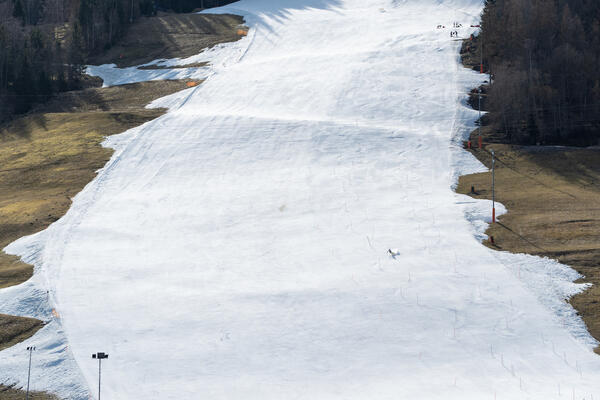
The underdog of our ecosystem
Environment PhD graduate stresses that preserving and restoring peatlands should not be underestimated

Environment PhD graduate stresses that preserving and restoring peatlands should not be underestimated
By Faculty of EnvironmentIndustrial oil and gas mining activities across the boreal forest in North America have changed our northern landscape, resulting in a vast network of linear disturbances called seismic lines. These lines are narrow clearings that have removed trees and compacted the soil. They cut across peatlands and forests, and have led to changes in the vegetation and how these ecosystems function.
One of the Faculty of Environment’s newest PhD graduates, Percy Korsah, spent the last five years investigating how these seismic lines alter carbon cycling in peatlands and its impact on climate change. Through his lab and field work, it has led him to understand the importance of preserving and restoring peatlands. Since Canada has the world's largest peatland carbon stock, he asserts we are natural custodians and managers of climate change and that protecting peatlands is a mitigation measure that cannot be underestimated.

Dr. Maria Strack and Percy Korsah on one of their field visits.
“Peatlands are the underdog superheroes for fighting climate change” he said. “They are special wetlands that play a very important role in the long-term storage of carbon in the form of PEAT, or organic soil, which stores twice as much carbon as forests."
Korsah’s research provided new information confirming seismic lines disturb peatlands and increases methane emissions more than previously thought. The findings will be useful for accurate greenhouse gas reporting for the boreal region. His work will also contribute baseline information for designing restoration projects for peatlands impacted by oil sands exploration and production. These contributions support the recommendations by the United Nations Environment Programme (UNEP) and advance this field that is growing in prominence and receiving more attention as the work to build a low-carbon future catalyzes.
Reaching this point in his academic career was not an easy task, nor without highs and lows. “Although the pandemic slowed us down, I had a great cohort of graduate students and lab team members to work with. We managed to adapt and continued collaborating and supporting each other to fulfil our academic goals. Now, it’s paid off.”
He also points out how the support of his supervisor, Dr. Maria Strack, was invaluable. “Despite her many commitments collaborating on multiple national and international peatland restoration projects, as well as serving as a Canada Research Chair, she was always available throughout my studies. She supported me with funding acquisitions, field work, weekly lab meetings and private writing and reviewing sessions. She is truly a natural leader infused with energy from the peatlands. Completing my doctoral journey under her supervision is a blessing and a privilege.”
Looking ahead to the future, Korsah said, “I definitely need to take a vacation, then a vacation to recover from my vacation. But after that, I’ll pick things up where I left off. I am looking forward to continuing to collaborate with my lab group and industry partners on peatland restoration and building my own consulting practice.”
Korsah convocated on Tuesday, June 13 with over 400 other graduates who also had their achievements celebrated.

(GettyImages/amriphoto)
Read more
Study reveals changes International Olympic and Paralympic Committees could implement to keep Games viable and safer for athletes

Read more
An ambitious research collaboration with Habitat for Humanity is reimagining home ownership across Waterloo Region and Canada

Read more
Here are the people and events behind some of this year’s most compelling Waterloo stories
The University of Waterloo acknowledges that much of our work takes place on the traditional territory of the Neutral, Anishinaabeg, and Haudenosaunee peoples. Our main campus is situated on the Haldimand Tract, the land granted to the Six Nations that includes six miles on each side of the Grand River. Our active work toward reconciliation takes place across our campuses through research, learning, teaching, and community building, and is co-ordinated within the Office of Indigenous Relations.